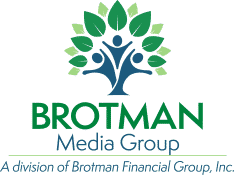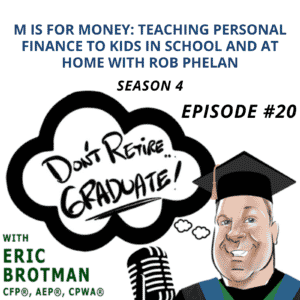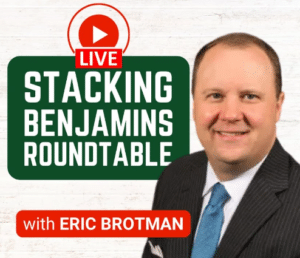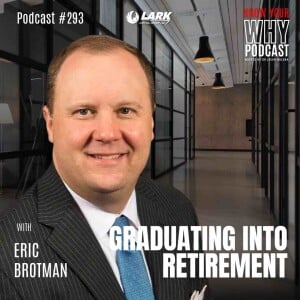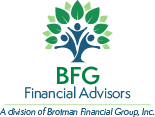Welcome back to Don’t Retire… Graduate! Today we’re going back to school with Rob Phelan, a high school math and personal finance teacher and author of the children’s book M is for Money. Rob is here, live from his classroom, to talk about money and the roadblocks we’re facing while advocating for personal finance education for kids.
In this episode we’ll talk about:
•The difference between math and personal finance
•Why we overestimate our abilities in nearly all aspects, but doubt our abilities to understand and make money
•Money stories and how we’re shaped to make decisions as children
•Why it’s so hard to create a formal education in personal finance
•The struggles teachers face when creating personal finance curriculums
•Nonprofit organizations that have resources available for schools and students
•How kids can start learning about money as early as preschool and how we can teach money concepts at different ages
•Entrepreneurship, pre-selling a business idea, and crowdfunding
•Understanding regret and buyer’s remorse as a child
•The ice cream theory of teaching patience and delayed gratification to toddlers
Visit www.misformoneybook.com to learn more about Rob’s book.
Guest Bio:
Rob Phelan
Rob Phelan is a high school math and personal finance teacher in Frederick, Maryland, a Certified Financial Education Instructor, business owner, and author of the recently published children’s book, M is for Money.
Rob is a passionate advocate for greater levels of financial education to help our youth make better financial decision moving into their futures.
[00:00:00]Eric Brotman: Welcome to Don’t Retire… Graduate!: The podcast that teaches you how to advance into retirement rather than retreating. I’m your host and valedictorian Eric Brotman and we have a phenomenal guest. We’re going back to school today with Rob Phelan. Rob’s a high school math and personal finance teacher in Frederick, Maryland so not far from us here. He’s a certified financial education instructor, a business owner, and the author of the recently published children’s book, M is for Money. Rob’s a passionate advocate for greater levels of financial education to help our youth make better financial decisions moving into their futures. And it’s time to go back to school. Rob, welcome to Don’t Retire… Graduate!
[00:00:38]Rob Phelan: Hey Eric, thank you so muchfor having me and welcome everyone to school. Yes, I am broadcasting from my high school classroom while I’m on my planning period. So it is great to join you in the middle of the school year.
[00:00:47]Eric Brotman: That’s fantastic. And if we, if we happen to hear a bell ring in the background, it’ll take us all back to many years ago. I don’t know if that even still happens in a school house.
[00:00:55]Rob Phelan: It does. It does. And I apologize if it does ring, but..
[00:00:59]Eric Brotman:No,no. Don’t apologize. That sound don’t apologize. That sound is going to take me back to a different age, a different time. So I don’t mind at all. Well, let’s dive right in because math and personal finance are not the same thing.Clearly, math has lots of uses well beyond just, just finance, but a lot of people are frightened by personal finance because of the math. Can you talk a little bit about how the two work together, but also how that can create an angst for young people and frankly, for folks of all ages.
[00:01:31]Rob Phelan:Yeah. And I think math and personal finance do share a lot both in terms of the mechanics, you know, handling money and the, the mathematical side, but also in the preconceived notions people have about the topic itself andtheir own abilities around the topic.So I think math is one of those classes where unlike, maybe a geography or an English or history, you’ll have people come in and they’ll say, well, I don’t have the math gene. Like no one says I don’t have the Englishgene, or I don’t have the science gene. Like it’s usually math is the one that we hear this.
And it comes from our experiences in youth. Particularly what our parents have modeled for us, what they have said to us. Maybe it’s some of the things that we have been exposed to prior to coming to a class like this and money is sort of the same thing that our environments that we grow up in is going to have a huge impact on what we know about money and also what we believe about money and what we believe about our own abilities when it comes to money too.So, yeah, I think it’s a, it’s a very astute observation that you have there, that there is a lot of similarities here and it’s, it’s a challenge for all of us who are going to learn about money, particularly if we’re going to be a financial educator, That we are going to have kids, adults, teachers, whoever you’re talking to with a lot of we’ll call it baggage, a lot of past experiences coming in around money that you have to kind of dig into, which is why usually I start with what’s your money story. So what a have, have you experienced about money already? What lessons have you learned about it? What emotions come up when you think about money? And then we can start to break those down and maybe confirm some beliefs and try and toss out other ones.
[00:03:07]Eric Brotman:As human beings, we tend to overestimate our ability at lots of things. For example, if you went into a room with 200 adults, and you said, how many of you are above average drivers? You know,190 of the 200 hands would go up and the other 10 were on their phone, not paying attention. We all think we’re better than average drivers, which of course, you know, mathematically is not possible. There’s a bell curve like everything else. But I would think math is one of those things and money especially where we tend to underestimate our ability where people just say, “oh, I’m not good at that.” And therefore they avoid it or, or shun it or delegate it, maybe even before they’ve tried, because they just have those beliefs that come from either childhood experience or watching their parents fight about money or any of those other kinds of things that there’s just not good at it.How is it that money specifically math in general, but money specifically are absolutely the antithesis of everything we do as humans? We all think we’re better than average at everything. We’re better than average singers, at least in the shower. We’re better than average athletes. Were better than average drivers, but we’re notgood at math.
[00:04:12]Rob Phelan:And it’s like, I w I’ll push back on that as well. I’ll measure my students before we do a class and afterwards as well. And I’m actually always genuinely surprised at how good they think they are at money.
So like, students will be like, “yeah, I understand money. I know how it works. I get it,” all that stuff. What they don’t believe in usually is their ability to do better and to become wealthier, to be good money managers. So like, yeah, I get how it works. I’m just going to be stuck at this level for the rest of my life. And it’s one of those things that the more you learn about it, the more you realize there’s so much more out there, it’s that paradox of the more you know, the less you know. I think that does definitely apply to money. At least I know it did in my own experience as well. I was like, yeah, I got a decent command of what this money thing is. Once I started learning about it. I was like, oh no, no, no, no. There is so much more to learn, particularly if you want to teach it, if you want to get on a path to financial independence, like there’s always more, you can learn. More ways to optimize, but getting a grasp of the basics is something we certainly can do as well without a ton of time and effort involved. But I, it, it, it’s weird how so many things we overestimate our ability. Oh, there it is.
[00:05:23]Eric Brotman:That is not the bell I remember.
[00:05:28]Rob Phelan:It’s a digital bell, it’s not, it’s not like a, an actual physical battle outin the hallway. That’s a little bit more like jump and very intimidating sound. Yeah.
[00:05:35]Eric Brotman:It’s it’s now second period.
[00:05:37]Rob Phelan:Yes. But you’re totally right in that. We’re we’re very weird and how we estimate our abilities, particularly compared to others. This is one of those scenarios where I think we all just have an incorrect potentially assumption of how good we are at money. And you, you look at the statistics of financial literacy in the U.S. The average adult cannot pass a basic financial literacy exam. We ranked 15th in the world in terms of nations for financial literacy scores, despite having the, I think second highest wealth per capita in the world. So it’s interesting how, like, we have so much money, but we’re not very good at managing it compared to other countries or compared to even our peers around us sometimes.
[00:06:17]Eric Brotman:So where, where does the curriculum come from for the personal financial literacy education you’re doing? Because youknow, I’ve
had lots of conversations with leaders at our state Capitol in Annapolis with teacher’s unions, with lots of different groups to try and figure out what it would take to get a true personal financial literacy course as part of our graduation requirements. And different districts, different counties have made it, made it possible. And certainly some of the private schools have done it and some have not. So there’s no real standard. And then every state has their own plan. So what is, what is the curriculum? Is there such a thing as an ideal personal financial literacy curriculum or is it really just a math unit that’s converted into, into dollars and cents?
[00:07:03]Rob Phelan:Welcome to the world of education, where it is just that question ofhello. What’s going on here? Who’s doing what, what are the standards we’re trying to achieve? With math, for example, there is a set of national standards that most states try to adhere to, and then every state will build their curriculum of instruction to try and meet those standards. For personal finance it’s still very much in its infancy. We’re seeing states every couple of weeks now are passing legislation saying, yes, we’re going to make personal finance a one semester graduation requirement for high school students to graduate.And all of those states are now trying to figure out how do we do this? What are we going to do? What do we need to put in place? And curriculum is definitely one of those things. There are national standards out there from different organizations, but there isn’t really any generally accepted standard across the country for what kids should know about personal finance.So what happens is most states or most school districts will look for non-profit organizations or private organizations who are producing curriculum, who have produced their own standards and say, okay, we’ll, we’ll adopt these as our standard of use. So we’ll have the national council for financial educators has their own set of standards, which are great.Jumpstart has their own. Junior achievement has their own. Nexgen personal finance produces great curriculum with their own standards. Some states will just assemble their own and do their own thing. It depends. And what we would love to see is a more generally accepted standard for financial education.So I hope that we are going to move that way particularly in Maryland. And thank you so much for also advocating for a better personal finance in our state, because it certainly is needed..
[00:08:40]Eric Brotman:It seems like all these non-profits who do great work and I’m very familiar with junior achievement. I’m a big fan. I love what they do, but itsounds like they’re all recreating the wheel.They’re all coming out with something that’s designed to reach the same end, but the means to the ends are all different. And that means there’s going to be a disconnect between sort of the 10 things you must know about money before you graduate. So. And the way in which it’s being presented. And I don’t mean where every teacher has their own, maybe their own style, that’s different, but I’m talking about the actual, the actual nuts and bolts of what needs to be learned.So if we had to start from scratch today and we had to pick you know, the best of jumpstart and the best of junior achievement and the best of the national council and all these different places, where does that eventually reside? How, how do you figure out who for lack of a better word ownsthat content or has created that content.Is everybody trying to take credit for this themselves? Is there some ego happening? Or am I am I off base?
[00:09:44]Rob Phelan:It’s funny because I worked with ChooseFI which is a, another podcast. I’m very big in the financial dependent space and they have a nonprofit called choose FI foundation and I was the lead curriculum writer for high school.So we actually created our own personal finance curriculum that was going to be freely available for schools. Sowe also entered that space and we did so with the idea of let’s try and find the best of what’s out there and put it all in one spot. And you’re right. There is just so much out there and everyone is kind of putting their own spin on it.There’s differentareas of prioritization, there’s different activities, games there’s different ideas behind what needs to be learned. Is it more about financial literacy? Is it more about mindset, beliefs, values? So kind of more of a holistic personal finance sort of class. It’s very varied. And sometimes it even comes down to the individual teacher and what they are particularly interested in teaching because a lot of this has fallen down on the individual teacher to be creative and go find stuff themselves.So I would say it’s less of an ego and more of lots of nonprofits really trying to serve this space. There are more private organizations starting to produce their
own curriculum. I think particularly as they see school districts adopting this graduation requirement,they’re seeing the dollar signs now where they can move in and provide something that states will pay for versus the nonprofits.We’re all kind of just doing it for free or at a very low fee for the most part. I will say there’s very little bad curriculumout there for the most part. Like it’s, it’s good stuff. It does require a lot of picking through to find things that work for you, work for your students, work for their experiences, their beliefs about money, but you can’t really go too wrong with any of them.My personal favorite at the moment is next gen personal finance. That is totally nonprofit one. Again, they have a wonderful team. They provide great training for teachers, which is the part that I really love. So there’s a lot of on-demand and virtual content that you can do to train yourself up as a teacher so that you can learn more about personal finance and how to deliver it to your students.I don’t work for them or get anything for that. So that’s just a user perspective that they’re my favorite. So. But I know great things about junior achievement and jumpstart as well.
[00:11:50]Eric Brotman:One of the big pushbacks that we got and we ran into because I mean, I’ve even testified before the state Senate to try and make this happen. One of the big pushbacks we got was the teachers. Number one, didn’t know this stuff well enough to teach it because let’s face it. They also didn’t get this education as kids. It’s not like they, they learned it and they just have to hone their skills. They never learned it either in a lot of cases. And so a lot of their habits might not be very good.So teachers were hesitant to take on a curriculum that they really didn’t know themselves. And it sounds like you’ve, you’ve found some good sort of train the trainer programs out there, which is important. The other thing was, then you get into the idea that well teachers are number one, being asked to teach so many different subjects, and they’re asked to do so many different things.And ultimately they’re being judged by test scores that the kids receive as opposed to sort of well-rounded education. And since this isn’t on the test, so to speak that creates a strange conflict too. How much of that are you seeing at, you know, from your perspective, and I don’t meanto put you on the spot, but I presume you probably have some colleagues at least around the state, if not even in your own building who are having those thoughts too.
[00:13:02]Rob Phelan:Yeah. And I’ve heard pushback as well about there are so many other, I guess, subject areas that are also pushing for graduation requirements status, like environmental protection is one that comes to mind and that if you grant a graduation status to personal finance. How do you say no to the other ones?And then if yousay yes to all of them, there just isn’t enough time in the day to do all these things. Our school system at the moment does prioritize mathematics, science, English, a foreign language, you know, as a very high level graduation requirement, then you have elective courses, which usually a kid has to pick maybe three to seven credits of electives to graduate during their high school career. And they kind of get to pick and choose between those there’s no real pathway they have to take. So if you’re going tointroduce personal finance as a graduation requirement, you have the challenge of course, of training the teachers. So very few teachers, as you said, have had any formal instruction on this.Most adults don’t. Teachers in particular are not getting this in their grad school programs or in undergraduate programs. So we’re sending teachers out into the world who are not particularly well paid. You know, based on what they put into their career and how educated they are, and then they also don’t know how to build wealth for themselves or how to pass that onto their students.So I do think that’s a place to start is just like, let’s start helping teachers to understand their own money a little bit more. And by just them knowing a little bit more, they’ll probably just start passing that onto their students in little bits and pieces. So that’s a place to just start without making a formal graduation requirement.But as you said, like there are other challenges too. Finding the space for it is probably the one that most school districts are struggling with. They already have like this filled schedule as a teacher. I know that I’m already crunched to get all of my math content fit into an entire semester and get students prepared for the test that we do have to take that the school gets measured on. Students get measured on. It’s a very competitive environment when it comes to getting into college and where GPA and sat scores and your M cap scores are going to be so important. So it does require a mindset shift thatwe don’t want that for personal finance. We don’t want to test the life and the fun out of it.This should be something that we learned out of genuine curiosity and interest and not something that we should have to measure to death if that makes sense.
Like my favorite part of teaching, the personal finance class I have right now is that it is a math class, but there’s really no formal testing that goes with it.It’s a class that I teach differently every single time I do it because I get to just follow the interest of my students and we get to go down these Mandarin paths. We get. See what’s happening in the news and make that a topic of conversation. And it’s, it’s so fun to do that. Like this past fall, we must have spent probably two weeks exploring theidea of blockchain and NFTs because it was just so topical. It was in the news. The kids were really interested in it. They want to know more about why these eight characters kept appearing on their newsfeeds. And that’s something that you wouldn’t be able to do in a very regimented course where the tests you have to worry about at the end. So I really don’t want to see that happen if personal finance does become a graduation requirement, I don’t want to see it tested to death..
[00:16:04]Eric Brotman:I love that because I agree with you. This should be something that’s, that’s perceived as fun and a life skill, as opposed to yet another standardized test. You also brought something else up that I think is probably the 500 pound gorilla in the space, which is who decides what is mandated in curriculum and what isn’t. I’ve heard zero people say that personal financial education is a bad idea.Absolutely zero. Everyone I’ve ever spoken to says what a great idea. And it’s always followed by sort of the big but. But we don’t want legislators, or we don’t want our elected officials to legislate curriculum because it’s a slippery slope. Because what everybody agrees is a good idea today in two years or four years or six years when there’s a different legislature,now you have politicians deciding which direction to go into legislator, additional curriculum. And invariably you can, you can muddy the water very quickly just by having ideas that maybe don’t belong in a classroom or that not everyone’s going to agree on. And you know, you really brought up the environmental piece. I don’t know anyone who would say that’s a terrible idea.We should learn about that. And there’s a hundred other things, just like it. The problem is how do you pick and choose and who do you want making that decision? And do you really want that to be politicized? And that’s why this has been so, so tough. I never expected to run into such a difficult set of challenges around something that was, I thought universally liked.It’s bizarre.
[00:17:37]Rob Phelan:Of course. And it’s like, it makes sense. Why is this so hard to do when it makes sense? And that just seems to be I mean our education system, our political system. Like it’s not, it’s not always common sense or it’s not always as simple as it seems. There are so many different things that you have to navigate.And the education system in general is this just giant ship that is very difficult to change direction on. Yeah. It’s, it’s, it’s, mind-boggling at times it’s frustrating at times. I’ve had that fantasy as a teacher of what would school look like if you made it optional. If you took the testing away and every kid and every teacher was there because they just simply wanted to learn. Like how many kids would still show up? What would they learn about? What the level of learning be like?Would we have a more prepared workforce as a result of this or would it would laziness and the easy way out dominate? Like, do we need the legislation there to make sure that everyone is kept accountable and things go the way they’re supposed to go? I’m not sure about the answer to that. I know from my own personal, like view of the world of my own personal bubble, that I think that we would have a more holistic, fun education system that kids really bought into.But I don’t know for sure. We do legislate the way we do because. Our powers that be, have decided that to produce a workforce that is going to advance our country is going to produce the most in quotation marks productive citizens is going to require ones that are more educated in the areas of math, science, technology, good command of communication and English skills.So those are the areas that we prioritize in school and we have done for decades. And once you put it in there, it’s kind of hard to take it out again.
[00:19:19]Eric Brotman:So I want to shift gears and talk about your book because there aren’t, I don’t think very many children’s books around money. Money and children aren’t often talked about except in the way that that money and children are the two things married couples fight about the most.So you’ve, you’ve written a book called M is for Money, which makes me, I can’t not channel cookie monster. And I know that’s because 45 years ago I was watching and C is for cookie was something that just stuck with me. So tell us about M is for money and where you came up with the idea and a little bit about it and then of course, where folks can get it and who it’s for.
[00:19:55]Rob Phelan:Okay. So this requires going back to when I started writing the curriculum for choose FI. We started with what are the skills that we
think a high school students should know upon graduation to become a adult who is capable of making good financial decisions, finding information they need and so on.And then we started backward, mapping it down through the different grade levels and we got to middle school. We were like, we can go earlier than this. There are things we can learn in elementary school, we got to elementary school. You know what there’s there’s earlier in this, the research is showing that kids are able to understand basic money concepts from around age three, and they do start learning about money from home through observation, conversations,experiences.And if we don’t think about it consciously in some way, we’re missing this huge learning opportunity and this potential space where we can influence the habits and mindsets kids have about money from a very early age so that they just go forward with this positive mindset about money and they understand how it works.They ask good questions, they know how to seek out information. They feel very comfortable talking about it rather than having to kind of unwind all of those negative associationsand taboos about money when they get to their twenties and start trying to figure out money. So we wanted to go younger. And like you said, there wasn’t a lot of money books out there for young kids.I can think of like one Bernstein bears book that was around probably when I was a kid. There’s a Dr. Seuss book. That was like 1 cent, 2 cents. It was just like a play on the one fish, two fish book. That was about it. And my son was born he’s two and a half now. So when he was born, I was like, okay, we’re going to try and do this money education thing from a young age.We love books. He loves books. What’s out there and there just wasn’t a lot out there. And most of what is out there is published by independent authors. So they’re actually hard to find and hard to find good books. So I was teaching entrepreneurship class at the time and this kind of came together. I want it to show the kids how to produce a business idea where you don’t have to put any of your own money into it.You basically pre-sell the entire value. And I had this kid’s book in my head to help young kids learn basic money words, build a vocabulary, encourage conversations with adults about money. And it just ended up being this great opportunity to say, “all right, let’s do this. Let’s bring out a kid’s book that is going to have money words in it.
